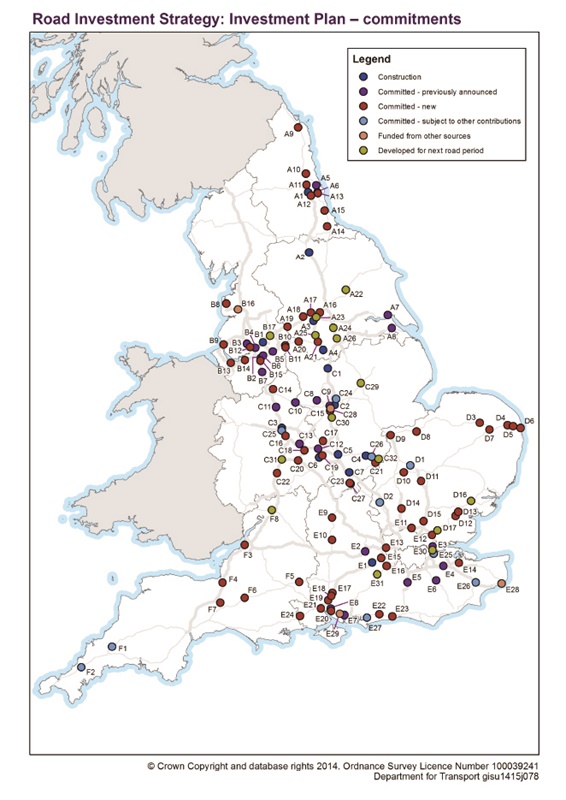01.12.14
Government announces plans for £15bn Road Investment Strategy
A tunnel under Stonehenge and transforming roads into ‘smart motorways’ are among the projects in the government’s £15bn Road Investment Strategy, the details of which were announced by the Department for Transport and the Treasury today.
Money for the new initiative, which covers investment lasting up to 2021, was first announced last year. It will triple investment in the roads by the end of the decade, the government said, with the announcement coming as a report from the RAC Foundation predicts there could be an additional seven million road users in England and Wales – taking the total to 43 million – within 20 years.
Included in the proposals is the long-rumoured 1.8-mile dual-carriageway tunnel under Stonehenge on the A303. The road links the M3 to Devon and is notorious for congestion. The project is part of £2bn to upgrade the south west road network, which also includes plans to dual the A358.
In the north east, £290m will be used to complete the dualling of the A1 all the way from London to Ellingham, 25 miles from the Scottish border.
For the north west and Yorkshire, smart motorways are the priority. An extra lane to manage traffic will be added along the entire length of the M62 from Manchester to Leeds. This is part of £1.5bn allocated for smart motorway conversion.
The north will also see improvements to trans-Pennine capacity from Manchester to Sheffield, representing the first increase in trans-Pennine capacity since 1971, the government says.
The plans also include better connections to the Port of Liverpool, £350m of improvements to the A27 along the south coast and £300m to upgrade the east-west connection to Norfolk, by dualling sections of the A47 and improving its connections to the A1 and A11.
The £15bn was first allocated in the 2013 Whitehall spending round, but today’s announcement sets out details about how the money will be allocated for the first time. It contains more than 100 projects, of which 84 are new.
Transport secretary Patrick McLoughlin MP said: “Today I am setting out the biggest, boldest and most far-reaching roads programme for decades. It will dramatically improve our road network and unlock Britain’s economic potential.
“Roads are key to our nation’s prosperity. For too long they have suffered from under-investment.
“This government has a long term plan to secure the country’s future and this £15bn roads programme is demonstration of that. Better roads allow us to travel freely, creating jobs and opportunities, benefiting hardworking families across the country.”
Chief secretary to the treasury, Danny Alexander, added: “World class infrastructure is vital if we are to build a stronger economy, but it matters in other ways too. It invigorates communities and gives people more opportunities to get on in life. This is why I have ensured that this government has prioritised funding roads, and railways, at a high level for future generations.”
The strategy also contains measures to improve the lives of communities affected by road upgrades, including £100m to improve cycling provision at 200 key locations across the network and £300m in environmental funds to mitigate carbon emission and reduce the impact on wildlife and countryside.
Transport campaigners have been severely critical of the government plans, saying it is a “waste of money” and calling for more investment in public transport, walking and cycling.
Sian Berry of the Campaign for Better Transport said: "The government's £15bn road-building plan will prove a counterproductive waste of money. There is no evidence that building new roads creates jobs or benefits the economy, and plenty of evidence that it creates new traffic that just fills up the roads again. What we really need is investment in public transport, walking and cycling for daily journeys to reduce congestion for other trips that have to be made on the roads. Instead, by laying tonnes of tarmac in areas supposedly protected for their beauty and history, the government will end up making people more reliant than ever on cars."
Chancellor George Osborne said: “Our long term-economic plan means today we can invest an unprecedented £15bn into Britain’s infrastructure to improve repair and expand our roads.
“Our plans will transform some of the country’s most important strategic routes, with ambitious projects to dual the A303, A1, A27 and the A47 as well as spending on important local infrastructure boosting productivity and helping local economies.
“For years our roads have been neglected. Now that this government is fixing the economy, we can afford to invest properly in our roads – unlocking jobs for the future and local growth by creating a road network that is fit for the 21st century.”
The new investment broken down by region is:
- North east and Yorkshire – 18 schemes worth around £2.3bn
- North west – 9 schemes worth £800m
- Midlands – 17 schemes worth £1.4bn
- East of England – 15 schemes worth £1.5bn
- London and south east – 18 schemes worth £1.4bn
- South west – 7 schemes worth £2bn
The below map and key from the DfT gives more detail on the individual projects:


Tell us what you think – have your say below or email [email protected]